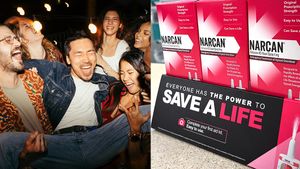
Treatment GuideJust DiagnosedSex & DatingAfrican AmericanStigmaAsk the HIV DocPrEP En EspañolNewsVoicesPrint IssueVideoOut 100
CONTACTCAREER OPPORTUNITIESADVERTISE WITH USPRIVACY POLICYPRIVACY PREFERENCESTERMS OF USELEGAL NOTICE
© 2025 Pride Publishing Inc.
All Rights reserved
All Rights reserved
By continuing to use our site, you agree to our Private Policy and Terms of Use.
COMMENTARY: I woke up last Wednesday screaming ' partly because I had a nightmare that someone was trying to kill me with a computer mouse and partly because it was 8:45 A.M. and I had a 10:00 A.M. flight to catch. Bizarre dreams are a common side affect of the medication I take to control my HIV. Though far less frequent than they used to be, each dream is still very intense. Picture your worst and best dreams in high definition, on an IMAX screen and with real actors running around you ' that's close to what it's like. It's an unavoidable and sometimes humorous part of my new normal. This particular dream was no doubt the result of having read through some of the colorful feedback and numerous emails in response to my last column. E-mails that ranged from supportive to ones with the subject line 'SLUT.' Shocking even to me, I had received 17 death threats based solely on that column. These were e-mails from strangers, flat out proclaiming their desire to kill me so I would stop 'killing others,' as they put it. On this morning, in my rush to the airport, I read through a few more. I have somehow started to find a certain curiosity in examining hate mail I receive ' how could someone equate me to a 'slut,' 'sexual predator' or 'HIV-deserving pedophile,' as a nice man from Ohio recently corresponded? On this Wednesday, I received a note that concluded I should go to jail and not be allowed to have sex ever again. Little did they know I was living part of that sentence already. That e-mail, ironically, was followed by an AmFAR e-mail blast, asking for support as they celebrated another year of progressive research for HIV/AIDS. The one thing these two missives had in common ' much like the ones calling for my death, and all the ones before ' was that they each expressed a different perspective on the message surrounding HIV/AIDS. Particularly the message this year, it being the 30th anniversary since HIV was first documented in the United States. I had contemplated this message for months. For years, really. This message, for me, remained so hard to articulate. I truly believe there is power in the conversation around HIV/AIDS today, but I have struggled to elaborate beyond that. What message should this conversation be supporting, debating, or developing? What makes this disease so very different from any other illness? Why is it still so hard talk about? How would conversation help? On one hand, HIV is manageable; in its 30 years they have made advancements unlike any other terminal illness of its kind. But on the other hand, there is this huge social stigma, perception, and cloud of preconceived notions that follow even the healthiest HIV-positive person. This message somehow had to articulate that difference, being sensitive to everything in between. By some miracle I made my flight that morning, and as I sat down in the front row of the short 45-minute trip north, I began a casual conversation with the woman next to me. She had just returned from seeing her mother in South Florida, who was diagnosed with cancer. She talked fondly of her father staying by her mother's side, and talked of her own husband who had helped through breast cancer. We eventually got on the topic of HIV. We discussed the common topics, nothing too intense and then, not planning on it, I asked her two questions. First one: 'Would you date someone with cancer?' 'Of course,' she said, without skipping a beat. 'Would you date someone with HIV?' I rattled off moments later. She began to answer and then paused. "Don't answer," I quickly said. The thoughts that happened within the ten seconds that she had paused, everything unsaid, each facial expression and subtle eye movement ' that's what made HIV different, even 30 years later. We parted ways and I never found out what her answer would be. She simply said, 'I get it.' Later that day, I thought about the impact those moments of pause had on me, how they manifest. It's no surprise that HIV is on the rise. Those moments of pause strike fear. People are still scared to get tested. People are still scared to disclose their status. The recent turmoil in Florida to keep funding for AIDS-related treatments is no doubt a result of so few being familiar with how managing this disease can sometimes be a financial and mental burden. It's a reminder of the stories I heard out of the Boston AIDS Coalition last year. Their clients who face discrimination in the workplace ' even today. Each instance the extension of words unspoken somewhere down the line. That day was a long one, but before I knew it I was on my way back to New York City. This time without conversation. My mind, as it often gets, was tired of trying to figure out that message. Once home, I checked my voice mail. It was my doctor, his courtesy call following my check-up earlier that week. I had been having issues with my numbers. Nothing major, but my T-cells were lower than normal. Though my viral load was also low, an oddity and a good thing, as the virus seemed under control. A mental trick, as long as my viral load remained virtually undetectable (at its lowest numbers), things 'seemed' better and I seemed clean. But this time his message revealed that the numbers had shifted 'my viral was load up. It was detectable. I was detectable. In a split second, I felt completely different. That one number was the other half of what makes this disease so unique. The virus and all it's perceived to be, for some ridiculous reason, can make you feel dirty, less than a person, and infected. I had gone from a successful business trip that day to feeling compromised and gross that night. Finding medication to address this fluctuation would be the easy part. Learning to feel like you used to ' clean, responsible, and attractive ' is a little more difficult. I'm still searching. That night I found myself somber, trapped somewhere between the anxiety of the night's pending scary dreams and the discomfort in my own skin. As I reached into my bedside table and grabbed the bottle of Altripla, the pill I take each night, I had a moment. I realized the significance of that pill and others like it. A pill that 30 years ago was merely a dream. A pill that actually allowed us to no longer fear dying of AIDS. But because we are human and make things difficult, a new fear manifested. And there it was, this new fear, the common link between my reaction to that one number, the pause in a stranger's response earlier that day, the e-mail calling me a slut, and even those ridiculous 17 death threats ' each a reminder that while we are no longer scared of dying from HIV, we are each in some way scared of living with it. Scared of being infected. Scared of being judged. Scared of someone lying about his or her status. Scared of getting sick. Scared of a sex life forever changed. Scared of what your friends may think, for taking a chance on love. Scared of never finding love. Scared of being alone. Scared of a world scared of you. And perhaps the message for me, in this 30th year, is the reality that there is no pill for fear. It will solely be reliant on the conversations we have and the responsibility we take to forge change. A responsibility we all will be held accountable for in the next 30 years, regardless of how scared we might be today. - Tyler Helms is an award-winning advertising executive and former TV journalist. Tyler has been HIV-positive since 2007 and on medication since June 2009. He's been sharing his story publicly since World AIDS Day, 2009.
From our Sponsors
Most Popular
Why activist Raif Derrazi thinks his HIV diagnosis is a gift
September 17 2024 12:00 PM
How fitness coach Tyriek Taylor reclaims his power from HIV with self-commitment
September 19 2024 12:00 PM
Out100 Honoree Tony Valenzuela thanks queer and trans communities for support in his HIV journey
September 18 2024 12:00 PM
Creator and host Karl Schmid fights HIV stigma with knowledge
September 12 2024 12:03 PM
The freedom of disclosure: David Anzuelo's journey through HIV, art, and advocacy
August 02 2024 12:21 PM
From ‘The Real World’ to real life: How Danny Roberts thrives with HIV
July 31 2024 5:23 PM
Eureka is taking a break from competing on 'Drag Race' following 'CVTW' elimination
August 20 2024 12:21 PM
California confirms first case of even more deadly mpox strain
November 18 2024 3:02 PM
Ricky Martin delivers showstopping performance for 2024 World AIDS Day
December 05 2024 12:08 PM
Plus: Featured Video
Latest Stories
A camp for HIV-positive kids is for sale. Here's why its founder is celebrating
January 02 2025 12:21 PM
This long-term HIV survivor says testosterone therapy helped save his life.
December 16 2024 8:00 PM
'RuPaul's Drag Race' star Trinity K Bonet quietly comes out trans
December 15 2024 6:27 PM
AIDS Memorial Quilt displayed at White House for the first time
December 02 2024 1:21 PM
Decades of progress, uniting to fight HIV/AIDS
December 01 2024 12:30 PM
Hollywood must do better on HIV representation
December 01 2024 9:00 AM
Climate change is disrupting access to HIV treatment
November 25 2024 11:05 AM
Post-election blues? Some advice from mental health experts
November 08 2024 12:36 PM
Check out our 2024 year-end issue!
October 28 2024 2:08 PM
Meet our Health Hero of the Year, Armonté Butler
October 21 2024 12:53 PM
AIDS/LifeCycle is ending after more than 30 years
October 17 2024 12:40 PM
Twice-yearly injectable lenacapavir, an HIV-prevention drug, reduces risk by 96%
October 15 2024 5:03 PM
Kentucky bans conversion therapy for youth as Gov. Andy Beshear signs 'monumental' order
September 18 2024 11:13 AM
Study finds use of puberty blockers safe and reversible, countering anti-trans accusations
September 11 2024 1:11 PM
Latinx health tips / Consejos de salud para latinos (in English & en espanol)
September 10 2024 4:29 PM
The Trevor Project receives $5M grant to support LGBTQ+ youth mental health in rural Midwest (exclusive)
September 03 2024 9:30 AM
Introducing 'Health PLUS Wellness': The Latinx Issue!
August 30 2024 3:06 PM
La ciencia detrás de U=U ha estado liberando a las personas con VIH durante años
August 23 2024 2:48 PM
Tratamiento y prevención del VIH por inyección: Todo lo que necesita saber
August 23 2024 2:41 PM















































































